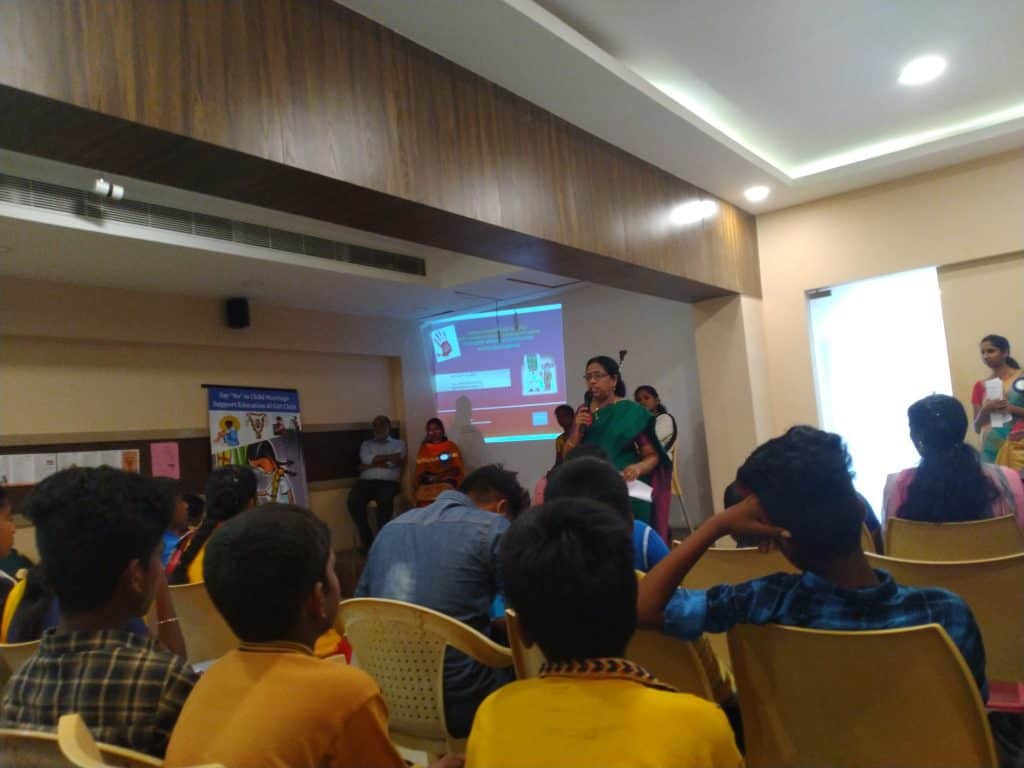C Akhila(name changed), a 12-year-old Muslim girl was forced into marriage by her family, six months ago. Her mother, who is going through a prolonged illness, persuaded her to get married to a 24-year-old man. The persuasion got violent when Akhila asked the groom to call off the wedding. “The girl threatened to complain to Childline if the wedding was not called off. Her family had hit her black and blue for doing so,” said Suganthi from Arunodhaya trust.
If you think child marriages are confined to rural areas, Akhila’s incident that happened in Chennai proves you are wrong. Tales of Akhila and many such children were narrated to formulate a solution at a campaign conducted by Arunodaya,Centre for Street and Working Children, in partnership with United Nations Children’s Fund (UNICEF) on 28 May at YMCA, Purasawalkam.
The two-day State Level Adolescent Consultation on ‘End Child Marriage’, was aimed at sensitising citizens about bonded labourers. Various cultural programmes, puppet shows, street plays were organised to empower people across all sections and age groups to stand against child marriage. It was an interactive session as children were quizzed about child marriage and share their thoughts with all others.
Akhila’s wedding was called off, thanks to her courage and the timely intervention by the staff of Arunodhaya Trust, who have been counselling her parents about the ramifications and consequences of child marriage.
Tales of agony
Freedom means a great deal for 27-year-old Rekha, who was a bonded child labourer at a brick kiln at Tirutanni. Her parents mortgaged her to repay a debt. From being bonded labour to getting married at the age of 13 and to finally tasting freedom, the journey was indeed rough for Rekha.
“I became an unhappy young mother of three children. I won’t blame my parents. Suffering from dire poverty, they believed my marriage would change everything,” said Rekha, struggling to control her tears, as she recalled her haunting past.
While the bitter memories from the past cannot be undone, Rekha is working towards her future. She owes her present lifestyle to Arunodhaya Trust staff, who rescued and rehabilitated her. She is a tailor and her husband is a daily wage worker.
At a time when schemes such as Bati Bachao Beti Padhao grab headlines, it is unfortunate that many young girls like Rekha and Akhila are forced to sacrifice their childhood. Experts blame it on the ineffective implementation of the existing laws and lack of awareness of their rights, among children.

Virgil D’Sami, Executive Director, Arunodhaya Centre for Street and Working Children addressing the gathering.
Implementation, a problem
“In a country like India, it is easy to bring a law but effective execution is a tough task. Despite the Child Marriage Act 2006, a lot of children are being married off every year. Children should raise their voice against this violation of their rights. It is important to break such cultural beliefs of the parents,” said Benny Jacob, from International Justice Mission (IJM).
“We have many cases but only a few courageously went against their parents to save their childhood. We rescued a fifteen-year-old girl, who opposed her wedding. She is now happy, as she receives education and is in the process of forgetting those bitter memories,” said Soumya, who works with Arunodhaya.
There are of course instances where the child rights activists have failed. In one such case, a fourteen-year-old girl was rescued only after the wedding. “After learning about the wedding, we tried to educate the girl’s family. But we were meted out harsh criticism and curses from the parents. The parents had strategically moved up the wedding date to avoid chaos. The girl got married, a day before the date planned and printed on the invitation,” Soumya said. By the time the team reached the spot, the girl was already married. She now lives with her in-laws. If only the girl had mustered courage and called the help line, things would have different.
The children present in the conference room also enjoyed various sessions like dance, drama, puppet shows. They were divided into groups and were asked to function in teams – to help them understand the importance of collective action in fighting social evils.
The takeaway from the event was quite simple, as Rekha rightly put it, “You will be aware of good and bad only with education. Education alone gives you clarity and conviction about life. It is the right of all children to get educated,”said Rekha.